CASS Outreach Camp on Computation Circuits
IEEE CASS Turkey Chapter organized a 2.5-day camp for those who need computation -no matter what scale, powerful, simple, low-energy or high-accuracy in their research and want to grasp the working principle of computational tools. Six technical lectures as well as six workshops and an open discussion night are organized. Thirty students, engineers and teachers with different age and background attended the program. The camp is successfully run with the collaboration of eight professors -six of whom work in the CAS field, teaching assistants from MEF University, and the Nesin Mathematics Village atmosphere that facilitates study and learning.
The first day is dedicated to digital computation circuits. So, the day is started with the lectures on Digital Electronic Circuits by Dr. Tuba Ayhan. The participants had a notion of transistors and Boolean arithmetic which are required to understand the algorithms and physics behind the commercial digital microprocessors and microcontrollers. The lecture is concluded with the basics of computer architecture. Four workshops are held in the afternoon: C Programming for Microprocessors, Getting Started with FPGA Design Flow, LED Blink with Microcontroller, and IoT Application with Microcontrollers. The workshops are repeated multiple times, so all participants could attend each workshop in a small group (~8). In the evening, Dr. Berna Örs gave a lecture on power-speed-area trade-off in embedded system design. She caught all the audience with an everyday laundry problem and concluded with designing a system that employs pipelining, parallel processing, and approximate computing circuits.
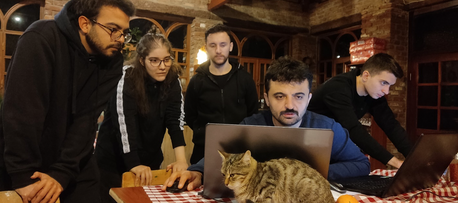
Figure 1 (Left): Dr. Yunus Babacan and interested participants study after dinner
In the second day we tried to see beyond digital circuits. Dr. Okan Zafer Batur gave a lecture on Neuromorphic Computation and Neuromorphic Circuits. He started his lecture with introducing a biological neuron. After giving concise information on NMOS, he analyzed circuits mimicking a neuron. Questions are raised by the audience: The circuits were much smaller and yet could do more computation yesterday, so do we even need an artificial neuron built with MOSFETs? Dr. Yunus Babacan took the floor and introduced Memristor and other circuit components that are widely used in neuromorphic circuits. In the afternoon Dr. R. Uğraş Erdoğan made a demo with Ag+ SDC (Knowm Inc.) Memristor. The final lecture of the day was Quantum Computing Algorithms by Dr. R. Uğraş Erdoğan and Dr. Acar Savacı. In the evening we had a free discussion session where all lecturers and the CASS Turkey Chair Dr. Müştak E. Yalçın were present. The floor was open to the participants too, the lecturers, students, industrial engineers, teachers, biologists expressed their expectations from computation circuits and opinions about next generation computation.
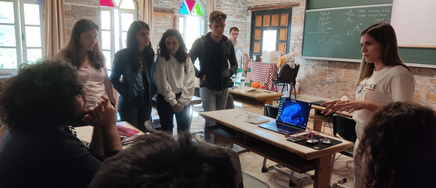
Figure 2 (Right): Microcontrollers workshop group
The third and the last day of the camp stated with a Mathematics Session. We joined a class where Dr. Ali Nesin asked a question about shuffling play cards. Trying to solve the problem, we studied some group theory aspects. Then, we designed a machine that applies Faro Shuffle on 2^n playing cards. This design concluded the camp.
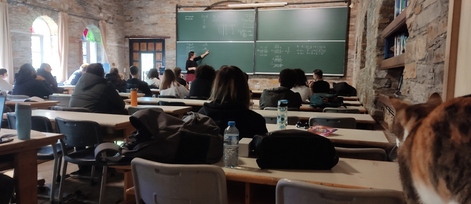
Figure 3 (Left): The first lecture with Dr. Tuba Ayhan
This packed program was only possible in the Nesin Mathematics Village in İzmir. The village aims to remove two obstacles to learning: fear and lack of focus. All participants -students and instructors, share the same environment day and night so the village provides an atmosphere where we can all learn from each other. With all these advantages, Nesin Mathematics Village is the perfect place to hold an outreach activity.
In addition to the technical activities, the participants had some leisure time before the first lecture of the day and during the lunch breaks. The participants had the time to have a short walk in the woods, through the Mathematics Village or in the iconic Şirince Village which is only 1 km away from the camp.
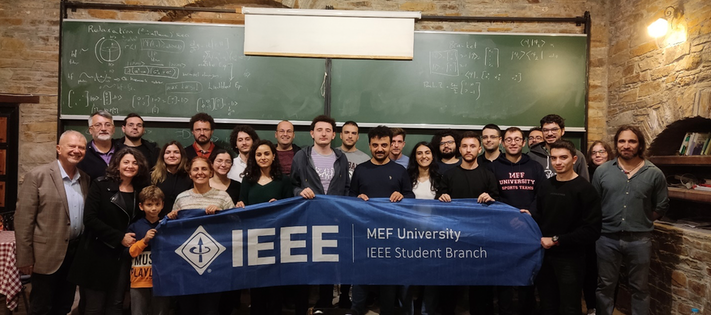
Figure 4 (Above): Group photo after a long evening discussion session
We would like to acknowledge the financial support from IEEE CAS, transportation support from İstanbul Metropolitan Municipality, workshop and lecture material support from MEF University, announcement and organization support from MEF Schools and Chamber of Electrical Engineers Istanbul Branch, material support from Empa Electronics, and last but not least hospitality from Nesin Mathematics Village.
This article was contributed by Tuba Ayhan, MEF University
_______________
Post Event Report on IEEE Circuits and Systems Society Workshop “CASS Day in Vietnam”
Hosting Chapter: Vietnam Chapter
Main Organizers: Xuan-Tu Tran CASS (Vietnam), Duy-Hieu Bui (CASS Vietnam), Mohd Nazim Mohtar (CASS Malaysia), Fakhrul Zaman Rokhani (SEA Ambassador)
Date: 2nd December 2022, Friday
Venue: The Information Technology Institute, Vietnam National University, Hanoi (VNU-ITI)
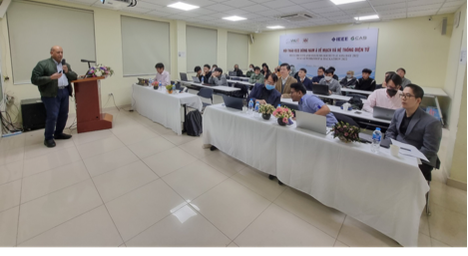
Left Photo: “The CAS Society: General”, Professor Amara Amara, IEEE CASS Past-President
IEEE Circuits and Systems Society (CASS) Vietnam Chapter has successfully organized a half-day workshop on 2nd December, 2022 at The Information Technology Institute, Vietnam National University, Hanoi, Vietnam. This workshop aims to gather scientists and experts in the field of circuits and systems to promote CASS in Vietnam during the post-pandemic period.
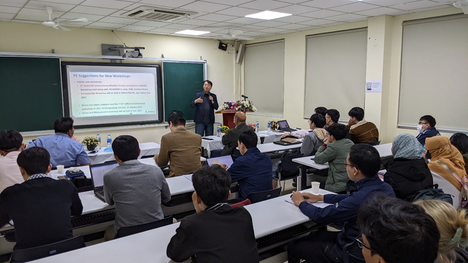
Right Photo: “The future of CAS society”, Professor Myung Sunwoo, IEEE CASS President-Elect
Please refer to the agenda as follows. We have reputable speakers from CASS to be in Hanoi to promote CAS society in Vietnam: general of CAS, future of CAS, and membership benefits followed by What is NEW in CAS to attract students and researchers to join the CAS family. Additionally, a chapter initiation meeting was organized to discuss the official establishment of the Vietnam CAS Chapter. It was a successful event with participants from different universities in Hanoi and representatives from SEA CAS Chapters.
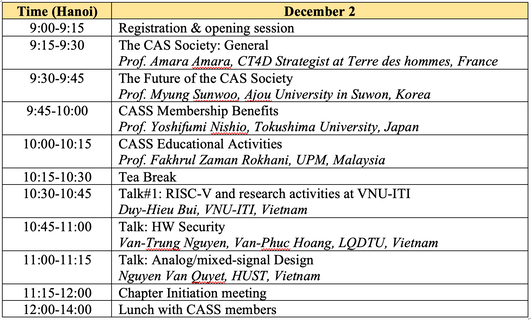
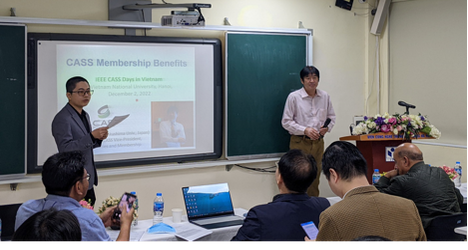
“CASS Membership Benefits”, Professor Yoshifumi Nishio, IEEE CASS VP
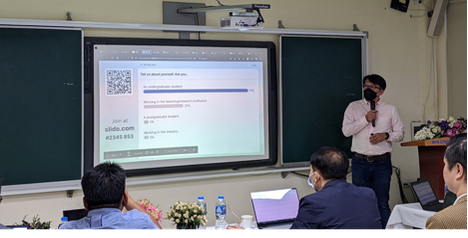
“CASS Educational activities”, Professor Fakhrul Zaman Rokhani, IEEE CASS SEA Ambassador
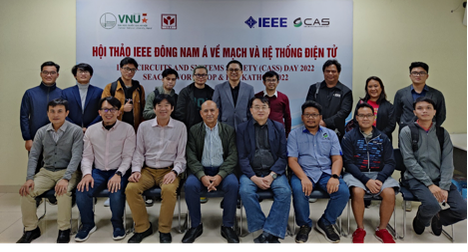
Group photo
This article was contributed by Duy-Hieu Bui, CASS Vietnam Chapter
_________________________
South East Asia on Circuits and Systems 2022 (SEACAS 2022)
IEEE Circuits and Systems Society (CASS) Vietnam Chapter has successfully organized a 2-day event on 3-4 December 2022 for South East Asia on Circuits and Systems 2022 (SEACAS 2022) and Student Hackathon. The SEACAS 2022/Student Hackathon event took place at VNU Information Technology Institute in Hanoi. Five chapters from South East Asia (i.e., Vietnam, Singapore, Malaysia, Indonesia, and Philippines) participated in the physical event, with 36 participants on the first day and 32 participants on the second day. During the workshop, each chapter presented and discussed its experience and best practices for managing/organizing a CAS chapter.
For the Student Hackathon, 20 students participated in the event. Fourteen were from Malaysia, Indonesia, Thailand, Philippines, and Singapore; each chapter had two student representatives except for the Malaysia chapter, with four students. The remaining six students were from Vietnam. To cultivate collaboration and cultural exchanges, seven groups were formed consisting of students from different countries. This year’s Hackathon’s theme was to build a Smart Campus environment for Vietnam National University Hanoi’s new campus in Hoa Lac with a total area of 11km2. The students were provided RISC-V development kits with sensors and actuators to make a prototype to solve an engineering problem related to the theme. The best project prize went to a team consisting of a Singapore student, Mr. Chong Yi Sheng, and a Philippines student, Mr. Lawrence Roman A. Quizon, with their “Smart Campus bins” project.
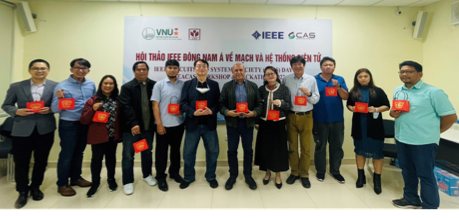
IEEE CAS Officers & representatives
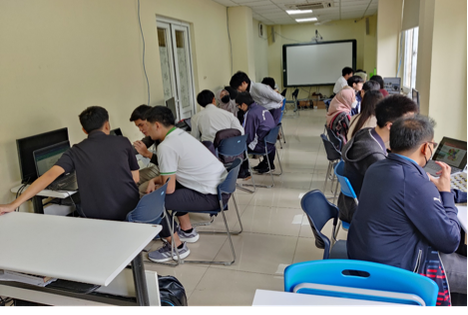
Student hackathon’s team discussion
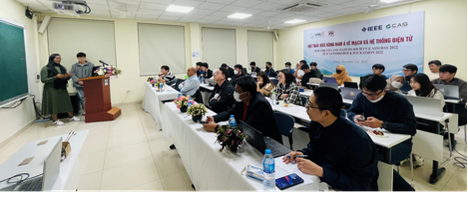
Student Hackathon’s presentation & evaluation
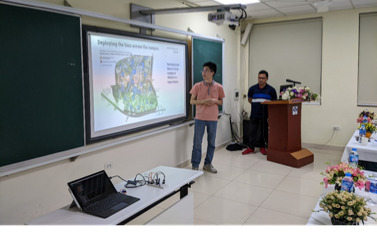
Mr. Chong Yi Sheng and Mr. Lawrence Roman A. Quizon (The first prize’s presentation)
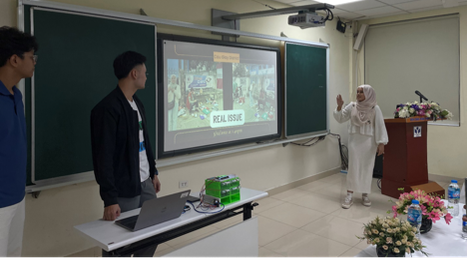
Photo (from left to right): Mr. Kraiwich Satrapiphop, Mr. Quang-Lam Dinh, Ms. Nur Amni Binti Zulfikri (The second prize’s presentation)
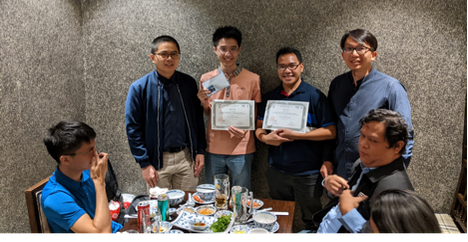
The first prize ceremony
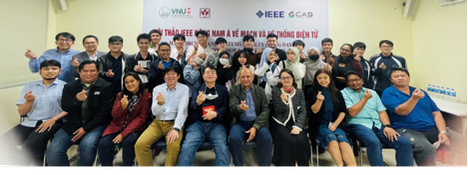
Group photo
This article was contributed by Duy-Hieu Bui, CASS Vietnam Chapter
________________________
One Day Tutorial on Neuromorphic Computing & AI
On November 16, 2022, the ED/CAS joint Chapter of the North Jersey Section conducted an educational event on Neuromorphic Computing and Artificial Intelligence (AI) at the New Jersey Institute of Technology (NJIT). The event was publicized by website and the participant registration was also done through the website. Thirty-eight undergraduate and graduate students were registered for the event. The program started with breakfast and coffee followed by a poster session where the poster presenters described their posters for five minutes. The posters were ReD-LUT: Reconfigurable In-DRAM LUTs Enabling Massive Parallel Computation” and “Power Reduction and Conductance Quantization by Process Optimization in HfO2-Based RRAM Devices for In-Memory Computing.”
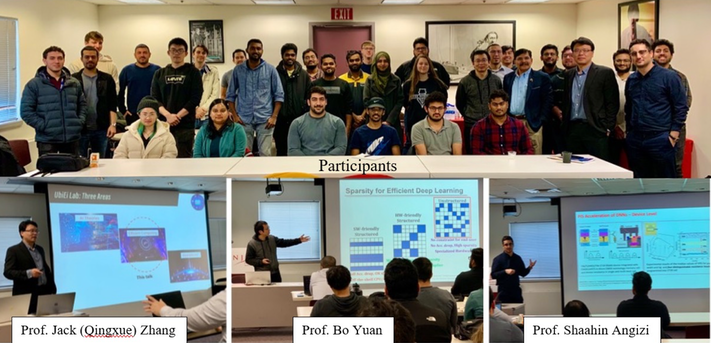
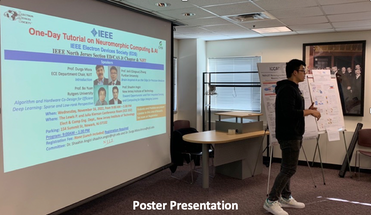
Following the poster presentation, the tutorial session started. An introduction of IEEE CASS’s activities and the membership benefits was provided by Prof. Durga Misra, Chapter Chair of the ED/CAS Chapter and Chair of the Electrical and Computer Engineering Department of NJIT. The first tutorial was given by Prof. Jack (Qingxue) Zhang of Purdue University on “Brain-Inspired AI on the Edge for Precision Medicine” where he discussed how uniquely combing AI theories, neuromorphic learning algorithms, efficient computing, and wearable/IoT monitoring, can target the smart health. He also highlighted the efforts on both efficient learning and neuromorphic learning for wearable big data applications. The second tutorial was given by Prof. Bo Yuan of Rutgers University on “Algorithm and Hardware Co-Design for Efficient Deep Learning: Sparse and Low-rank Perspective” where he introduced the algorithm/hardware co-design works for energy-efficient deep neural networks (DNN) from both the sparse and low-rank perspectives. He also demonstrated the benefit of using structured and unstructured sparsity of DNN for designing low-latency and low-power DNN hardware accelerators. The third tutorial was given by Prof. Shaahin Angizi of the New Jersey Institute of Technology on “Toward Opportunistic and Fast Integrated Sensing and Computing for Edge Imaging Systems” where he described the cross-layer (device/circuit/architecture/application) co-design of energy-efficient and high-performance processing-in-sensor and processing-in-memory platforms. This enables a smooth transition from the current cloud-centric IoT approach to a data-centric approach, whereby the mobile edge devices can opportunistically perform computation close to the sensor by repurposing the sensor/cache to a data-parallel processing unit remarkably reducing the power consumption and latency of data transmission to a back-end processor. At the end of the tutorials, an additional question-and-answer session was conducted for general discussion. The program ended with a lunch for all the participants.
This article is contributed by Prof. Durga Misra, CAS/ED Chapter Chair, and Prof. Shaahin Angizi, Chapter Vice-Chair, IEEE North Jersey Section